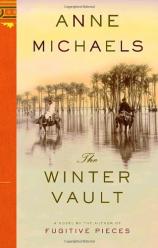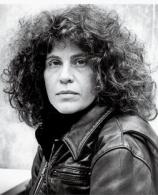Reading Group Guide
Discussion Questions
The Winter Vault

1. Discuss the metaphor of the title, The Winter Vault.
2. Have you read Michaels’s first novel, Fugitive Pieces? What parallels do you see between that novel and her new novel?
3. Reread the two passages at the very beginning. Now that you’ve read the entire book, what do the phrases “No image forgets this origin” and “No word forgets this origin” mean to you?
4. The book opens with Avery painting Jean’s back, and closes with her painting his. What is the significance of this act?
5. Throughout the novel, themes of human destruction and rebuilding play out. What do you think Michaels is trying to say? Can you think of any destruction in the novel that’s not human in origin?
6. How does Jean’s botany connect to Avery’s work?
7. What is the purpose of the Belzoni flashback on pages 30–32?
8. Why does Georgina Foyle affect Avery so strongly?
9. Words carry a lot of weight with the characters, especially through their storytelling. How do Avery, Jean, and Lucjan use words to achieve --- or avoid --- intimacy?
10. On page 93, Marina says, “Love must wait for wounds to heal.” Whose wounds is she talking about? How does this notion resonate throughout the novel?
11. Avery longs to save something, rather than destroy things. How does he finally do this?
12. Discuss the idea of home. How does it differ for the Nubians, the Poles, Avery, Jean, Lucjan?
13. On page 140, Jean talks about virtually indestructible seeds, which can lay dormant for centuries before sprouting. What is she really talking about?
14. “I want to build the room where I wish I’d been born,” Avery says on page 158. What does he mean by that?
15. How does Jean’s dream (pages 166–7) relate to her pregnancy? How does it change her?
16. What is the connection between Jean’s after-hours gardening and Lucjan’s “Caveman” paintings?
17. On pages 202–3, Jean realizes Lucjan’s painting “was not about Lascaux but about exile and the seizing of joy that will not come of its own accord.” Who else tries to seize joy, and how do they do it?
18. Reread the paragraph on page 214 that begins, “Cities, like people, are born with a soul. . .” Could you say the same about the Nubian countryside and the small towns along the St. Lawrence?
19. Daub writes to Jean (page 249): “Perhaps there is a collective dead. But there is no such thing as a collective death. Each death, each birth, a single death, a single birth.” What does this mean for Jean, for Lucjan, for the post-Holocaust world?
20. How does the jazz group the Stray Dogs fit into the larger story?
21. Reread and discuss Ranger’s rant on pages 266–7.
22. Several times in the novel, Lucjan tells Jean that we only get one chance to be happy in life, and if something goes wrong, that chance is lost forever. Where do you think that turning point is for him? For Jean? And Avery? Do you agree with this theory?
23. “Regret is not the end of the story; it is the middle of the story”(page 336). The novel closes with this thought. What does it mean?
The Winter Vault
- Publication Date: April 21, 2009
- Hardcover: 352 pages
- Publisher: Knopf
- ISBN-10: 0307270823
- ISBN-13: 9780307270825








